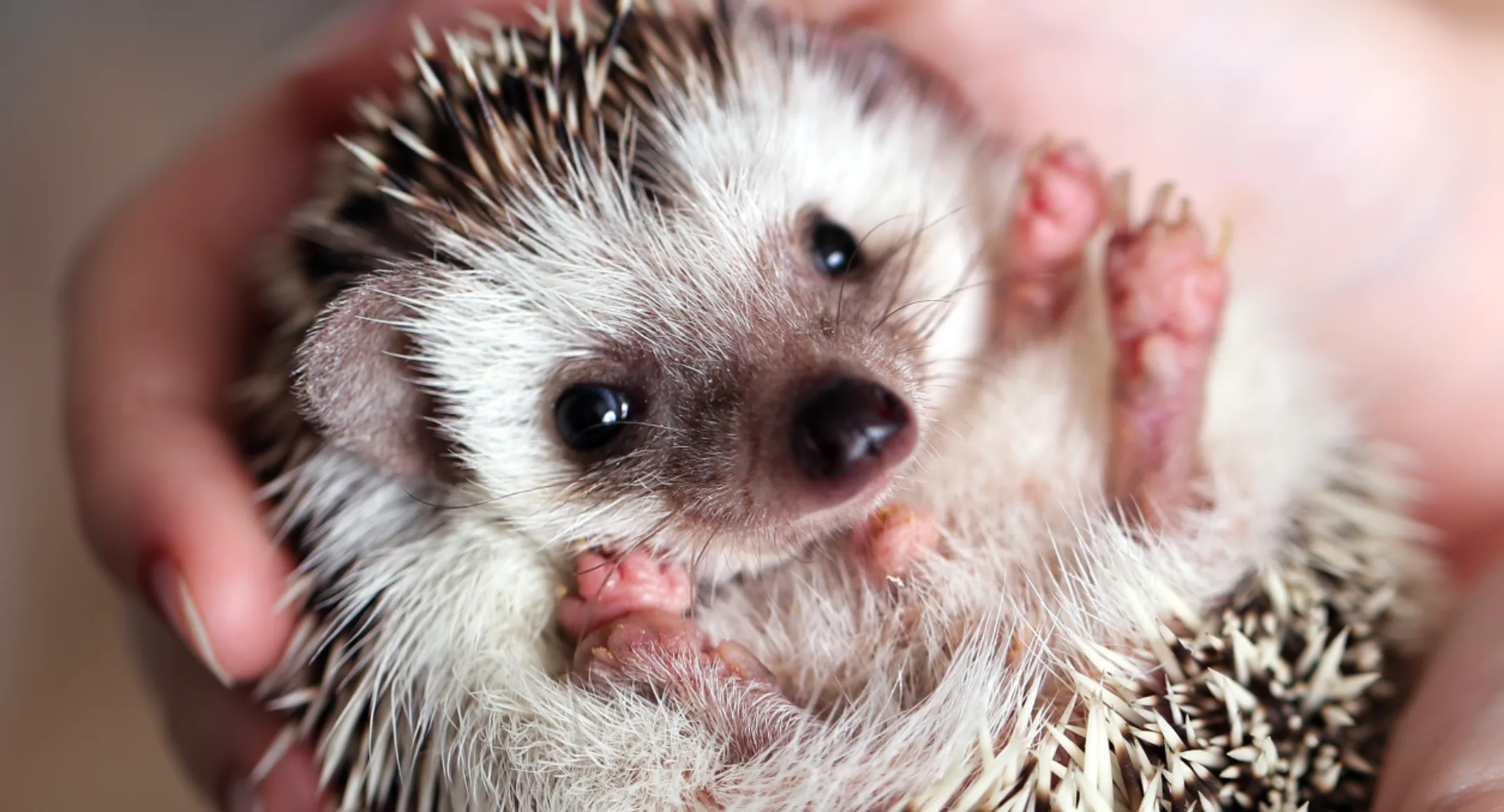Basic Husbandry
General Information
Vital Statistics
Body Weight: 300-600g
Life Span: 4-6 years
Sexual Maturity: Females 2-6 months, Males 6-8 months
Behavior and Handling
Hedgehogs are nocturnal. They tend to sleep soundly during the day and stay awake for most of the night. They are sensitive to light and prefer a dim, quiet environment.
Their primary method of protection is their ability to roll up into a ball and to erect their spines. They often make a hissing or huffing sound too!
Try to avoid excessive noise, needless excitement, and over handling.
Young hedgehogs are generally curious and do not mind being held. Adults (especially males) tend to resist handling and usually will not choose interact with humans no matter how much they were handled when they were young.
Hedgehogs are generally solitary animals and usually do better when they are caged separately
Hedgehogs are very sensitive to smells. Often, when they encounter a new smell, they will start to produce a large amount of frothy saliva. Then, they reach to their side and spread the saliva over their spines. They often wiggle around in weird positions in order to try to cover all of these spines. To someone not accustomed to seeing this behavior, it may look like the hedgehog is having a seizure…but this is a very normal behavior.
Hibernation is NOT recommended for hedgehogs in captivity. Captive hedgehogs do not have the same fat stores as wild hedgehogs and hibernation inhibits the immune system and hedgehogs become more susceptible to infection and illness.
Reproductive Information
Although hedgehog females may become sexually mature at 2 months old, they should not be bred until they are at least 6 months old.
Hedgehogs not bred by 18 months may experience fusion of the pelvis and difficult birth.
Male hedgehogs should not be allowed near newborns as this can result in cannibalism
Housing
Healthy hedgehogs are very active and need as large a cage as possible. A minimum of 2 x 3 feet should be provided.
Hedgehogs are able to climb and escape through small holes, so the cage must be secure and lidded.
Hedgehogs have tiny feet and long legs relative to their size and are predisposed to getting their legs caught in small holes. Therefore, it is important that all parts of the cage have solid surfaces as opposed to wire mesh or grates, including cage bottoms, wheels, ladders, shelves and tubes.
Bedding such as towels without loose threads, fleece, paper bedding such as Carefresh™ or other shredded paper products should be used.
Any cloth in the cage should have a tight weave that will not allow nails to become entrapped. They should also be checked for fray or loose strings as these can become wrapped around the legs and compromise blood supply.
Exercise wheels are highly recommended since hedgehogs are predisposed to obesity and should be let out in a large area daily for exercise.
It is important to provide an appropriately sized hide box for your hedgehog as well. Plastic igloos and wooden hide boxes are commercially available at most pet stores.
Hedgehogs are very sensitive to temperature. The ideal temperature for hedgehogs is between 75 ºF and 85 ºF. Any temperatures below 75 ºF may results in a state of torpor—which means they might become slow, wobbly, inappetant and unresponsive!
Diet
Wild African hedgehogs are insectivore/omnivores and feed on a variety of invertebrate prey as well as plants and occasional vertebrates.
The bulk of the captive hedgehog diet should consist of commercially prepared hedgehog/insectivore food, 3-4 teaspoons per day. High quality low calorie cat chow may be offered but does not seem adequate as the sole component of the diet. To prevent obesity, ad lib feeding should be avoided.
In addition to the main diet, 1–2 teaspoons of varied moist foods (such as canned cat food, cooked meat or egg, low-fat cottage cheese) and 1/2 teaspoon of fruit or vegetables (beans, cooked carrots, squash, peas, tomatoes, leafy greens, banana, apple, pear and berries) should be provided daily.
Acceptable treats include mealworms, earthworms, wax worms, and crickets.
All diet changes should be done gradually to avoid gastrointestinal upset.
Water should be offered in a sipper bottle or spill proof bowl and should be changed daily.
You may clean food and water dishes with mild soap and water or soak them in a dilute (1:30) bleach water solution.
Common Medical Conditions
Conditions Requiring Veterinary Attention
Eyes, Ears, and Mouth
Corneal ulcers or ocular trauma may occur. Symptoms include redness, swelling, bleeding, or discharge from or around the eye.
Hedgehogs have shallow orbits, meaning their eyes may bulge and be more prone to trauma. This may occur in hedgehogs with facial tumors or tumors behind the eye, as well as those with loss of facial muscle mass.
Hedgehogs are particularly prone to oral tumors and to dental disease. Both may be painful and may result in the loss of several teeth. It is important to monitor your hedgehog’s appetite, weight, and ability to eat.
Gastrointestinal disease
Intestinal infection may be caused by Salmonella from feeding raw meat or eggs.
Intestinal obstruction may be caused by foreign body ingestion, parasites, or GI cancers. Signs may include loss of appetite, vomiting, and lethargy.
Noninfectious diarrhea or irritation is often caused by sudden dietary change or GI cancers.
Urogenital disorders
Bladder stones have been noted in hedgehogs. Signs may include change in urine color, straining to urinate, inappetence or lethargy. Changes in urination can also occur with UTI
Kidney disease is also common in hedgehogs.
Female hedgehogs are prone to reproductive tumors and infection, especially as they get older. Signs include bleeding or discharge from the vulva, inappetence, lethargy, or abdominal pain.
Respiratory Infections
Predisposing factors for upper and lower respiratory infections include suboptimal temperatures, dusty or unsanitary bedding, malnutrition, concurrent disease or lowered immune system
Signs include nasal discharge, increased respiratory noise, difficulty breathing, lethargy, and loss of appetite
Frequent gasping or open-mouth breathing is a sign of respiratory distress and is a medical emergency.
Musculoskeletal and Neurologic Diseases
Obesity can result from overfeeding or excessive treats in the diet and can predispose a hedgehog to many other diseases
Bone fractures or constriction injury to the legs may result from an inappropriate enclosure or free-roaming accidents. Always supervise your hedgehog when outside its enclosure
Older animals, especially if overweight, may develop osteoarthritis
Wobbly hedgehog syndrome is a neurologic condition that causes deterioration of the nervous system and progressive ataxia. The cause is unknown though may be genetic, and there is no cure.
Common Skin Diseases
Lice and mites are very common skin parasites in newly acquired hedgehogs. Mites can also become a problem in geriatric animals. Symptoms include itchy and/or red skin, hair loss over the body, and irritability. Treatments may include injections, topical treatments, or oral meds that kill parasites and are safe for your hedgehog.
Hedgehogs are highly prone to tumors at 3+ years of age, and this includes those of the skin. Signs range from discrete raised masses to recurrent or non-healing wounds.
Emergency / Critical Care
All emergencies require veterinary assistance. Use the following guidelines to assist you in caring for your pet until you can contact a veterinarian.
Traumatic Injuries
Broken Bones
Provide your hedgehog with soft bedding such as a towel or blanket.
Minimize handling.
Keep your pet in a warm, dark, and quiet area.
Keep your pet as calm as possible and contact a veterinarian or local animal emergency clinic immediately.
Skin Injuries/Blood loss
For any type of injury with blood loss, use direct pressure with a towel or clean gauze to prevent further blood loss. Contact your veterinarian immediately if you are unable to stop the bleeding.
Severe Illnesses and Other Conditions
Head Injuries and Head-Tilt
Provide your pet with soft bedding such as a towel or blanket.
Minimize handling.
Keep your pet in a warm, dark, and quiet area.
Keep your pet as calm as possible and contact a veterinarian or local animal emergency clinic immediately.
Respiratory Distress
If your hedgehog experiences open-mouth breathing or gasping for air, remove all bedding and minimize handling and stress.
Keep your hedgehog in a comfortable, dark, and quiet environment until you are able to reach your veterinarian or local animal emergency clinic.
Health Recommendations
Things for your veterinarian to do:
Annual Physical
Always have an initial physical exam performed on any newly acquired hedgehog. During the exam, the doctor will check the teeth, eyes, ears, heart, lungs, and abdomen. The doctor will also check the hair and skin for external parasites. Due to their temperament, sedation may be recommended for a thorough exam
You should have your pet’s fecal sample checked yearly for internal parasites.
Your hedgehog should have an annual physical done by a veterinarian every year. Hedgehogs do not require vaccinations.
Things for you to do:
Dental disease
Tartar control treats made for cats may be helpful in preventing dental disease and loosening tartar. Give in moderation as with other treats.
Overgrown Nails
Hedgehogs should have their nails checked/trimmed on a regular basis. If the nails get too long, they can become caught on the cage or toys and break off causing pain and bleeding.
If any of the nails break off and begin to bleed, apply styptic powder, flour, or cornstarch to encourage clotting, and apply direct pressure to the nail. If you cannot stop the bleeding, contact a veterinarian.
Nail trims are also recommended to prevent the nails from overgrowing and cutting into the feet.
Over-the-Counter Medication
Over-the-counter topical triple antibiotic ointments or any other types of over-the-counter medications are not recommended without first consulting your veterinarian. Productions such as triple antibiotic ointment (for the use of minor skin injuries) can cause digestive problems if ingested and can cause digestive problems if ingested and can potentially become toxic over time.

